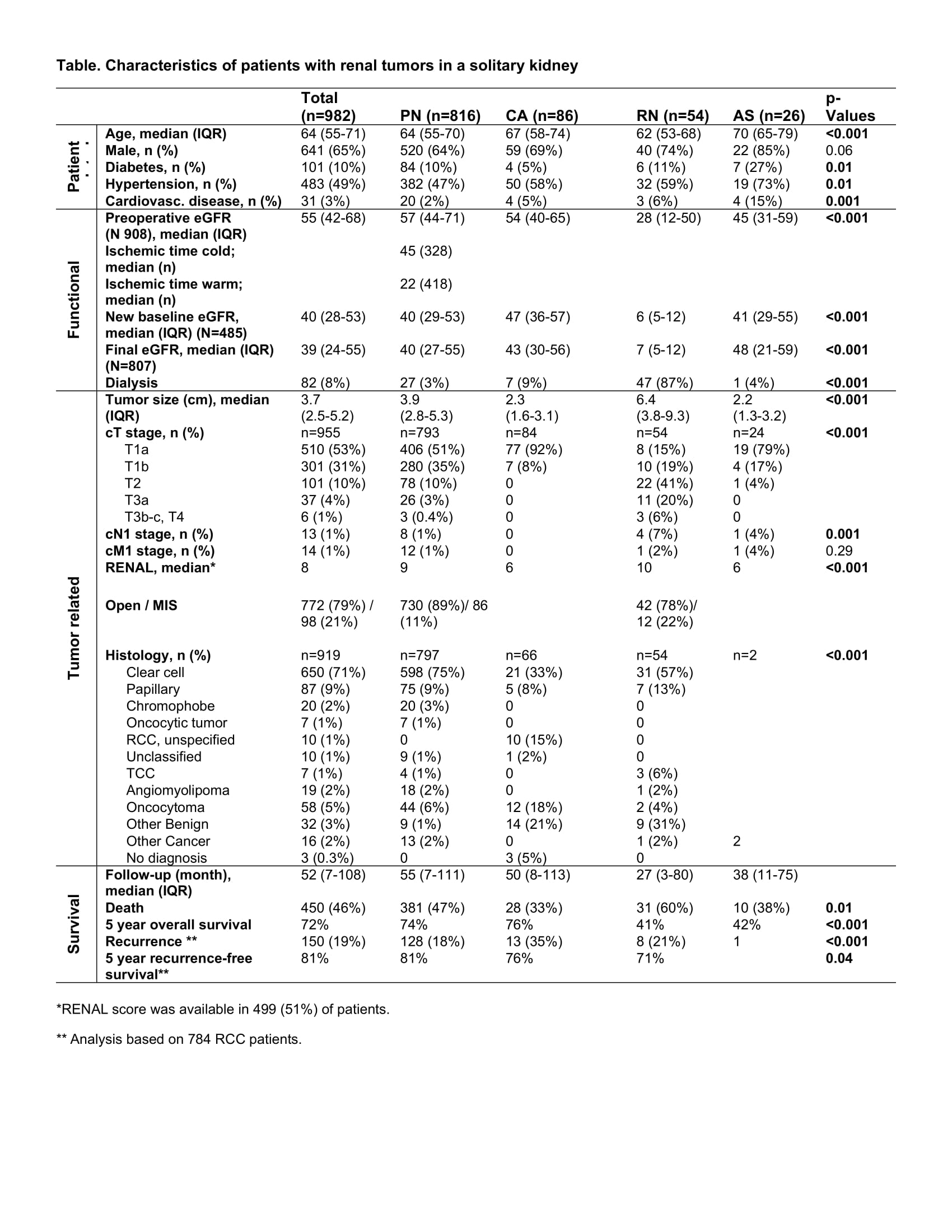Back
Poster, Podium & Video Sessions
Podium
PD33: Kidney Cancer: Localized: Surgical Therapy II
PD33-01: Comprehensive Management of Renal Masses in Solitary Kidneys
Saturday, May 14, 2022
3:30 PM – 3:40 PM
Location: Room 245
Yosuke Yasuda*, JJ Zhang, Nityam Rathi, Gustavo Roversi, Ao Zhang, Diego Palacios, Jihad Kaouk, Georges-Pascal Haber, Venkatesh Krishnamurthi, Robert Abouassaly, Christopher Weight, Steven Campbell, Cleveland, OH
- YY
Yosuke Yasuda, MD
Tokyo Medical and Dental University
Podium Presenter(s)
Introduction: Renal mass in a solitary kidney (RMSK) has traditionally been managed with partial nephrectomy (PN). However, cryoablation (CA) and active surveillance (AS) are alternatives, and radical nephrectomy (RN) is also occasionally required. Most studies on RMSK have focused on patients for whom PN was achieved. Our objective was to provide a more comprehensive analysis of management strategies and outcomes.
Methods: All 1024 patients diagnosed with RMSK (1980-2021) at our institution were queried. After exclusion of horseshoe kidneys, 982 patients were analyzed. Baseline characteristics, pathologic, functional and survival outcomes were analyzed.
Results: Of 982 patients, 816 patients underwent PN, 86 CA, 54 RN and 26 AS. Patients were predominantly male (65%) with median age 64 and BMI 29. Median tumor size and RENAL were 3.7 cm and 8, respectively. Familial etiology was identified in 18 patients (2%). Median follow-up was 52 months. 22 patients (2.2%) with cc RCC, median tumor volume 188 cc and RENAL=10 (median 11) received TKI to help facilitate PN. Median tumor volume and RENAL were 88 cc and 10 after TKI, and PN was successful in 20(91%). For PN, median warm/cold ischemia times were 22/45 min, respectively. For PN, median preop. GFR was 57 and new baseline and long-term GFR’s were both 40, as function generally remained stable after surgery. Long-term dialysis after PN was required in 27 patients (3%). 41 patients had planned RN (4.2%), most often due to severe CKD (median preop. GFR=18). 13 patients were converted PN?RN (1.6%). Clavien III-V complications were observed 10% of PN, 3% CA and 35% RN patients. 90-day mortality was 1%. CA and AS were mostly chosen for SRMs (median 2.2 cm) in older/frail patients. 5 year overall survival for PN, CA, RN and AS were 74, 76, 41 and 42%, respectively (p < 0.001). 5 year RFS for PN, CA and RN were 81, 76 and 71%, respectively (p=0.04).
Conclusions: Nephron-sparing approaches are feasible in most patients with RMSK, with dialysis only occasionally required. PN in this setting is often challenging but can be facilitated by TKI. CA and AS can also play a role in appropriately selected patients. RN is occasionally required due to severe CKD, overriding oncologic concerns, or occasional conversion from PN. This study is the largest cohort of patients with RMSK, and the first to provide a comprehensive analysis of all management strategies.
Source of Funding: None

Methods: All 1024 patients diagnosed with RMSK (1980-2021) at our institution were queried. After exclusion of horseshoe kidneys, 982 patients were analyzed. Baseline characteristics, pathologic, functional and survival outcomes were analyzed.
Results: Of 982 patients, 816 patients underwent PN, 86 CA, 54 RN and 26 AS. Patients were predominantly male (65%) with median age 64 and BMI 29. Median tumor size and RENAL were 3.7 cm and 8, respectively. Familial etiology was identified in 18 patients (2%). Median follow-up was 52 months. 22 patients (2.2%) with cc RCC, median tumor volume 188 cc and RENAL=10 (median 11) received TKI to help facilitate PN. Median tumor volume and RENAL were 88 cc and 10 after TKI, and PN was successful in 20(91%). For PN, median warm/cold ischemia times were 22/45 min, respectively. For PN, median preop. GFR was 57 and new baseline and long-term GFR’s were both 40, as function generally remained stable after surgery. Long-term dialysis after PN was required in 27 patients (3%). 41 patients had planned RN (4.2%), most often due to severe CKD (median preop. GFR=18). 13 patients were converted PN?RN (1.6%). Clavien III-V complications were observed 10% of PN, 3% CA and 35% RN patients. 90-day mortality was 1%. CA and AS were mostly chosen for SRMs (median 2.2 cm) in older/frail patients. 5 year overall survival for PN, CA, RN and AS were 74, 76, 41 and 42%, respectively (p < 0.001). 5 year RFS for PN, CA and RN were 81, 76 and 71%, respectively (p=0.04).
Conclusions: Nephron-sparing approaches are feasible in most patients with RMSK, with dialysis only occasionally required. PN in this setting is often challenging but can be facilitated by TKI. CA and AS can also play a role in appropriately selected patients. RN is occasionally required due to severe CKD, overriding oncologic concerns, or occasional conversion from PN. This study is the largest cohort of patients with RMSK, and the first to provide a comprehensive analysis of all management strategies.
Source of Funding: None


.jpg)
.jpg)